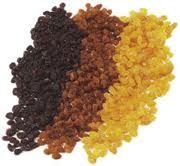
Do Raisins Have Protein?
Understanding Their Nutritional Value
Exploring the Protein Content in Raisins
Raisins are a popular dried fruit enjoyed as a snack, in baking, or as a healthy addition to salads. While they are often praised for their natural sweetness and convenience, many people wonder about their nutritional profile, particularly regarding protein content. In this article, we will explore whether raisins contain protein, their overall nutritional benefits, and how they can fit into a balanced diet.

raisin 3
The Nutritional Profile of Raisins
What Are Raisins?
Raisins are dried grapes that undergo a dehydration process, which concentrates their sugars and nutrients. They are available in various types, including black, green, and golden raisins, each offering slightly different flavors and nutritional profiles. A standard serving of raisins (about 1 ounce or 28 grams) contains the following nutrients:
- Calories: 85
- Carbohydrates: 22 grams
- Fiber: 1 gram
- Sugars: 17 grams
- Protein: 1 gram
- Fat: 0 grams
As you can see, while raisins are primarily a source of carbohydrates and natural sugars, they do contain a small amount of protein.
Protein Content in Raisins
When considering protein content, it’s essential to note that raisins are not a significant source of protein compared to other foods. A typical serving of raisins provides about 1 gram of protein. While this amount is relatively low, raisins can still contribute to your daily protein intake when consumed as part of a balanced diet.
Health Benefits of Raisins
Nutrient-Dense Snack
Raisins are nutrient-dense, meaning they provide a variety of essential vitamins and minerals in a small serving size. They are rich in antioxidants, particularly flavonoids and phenolic acids, which help protect cells from oxidative stress. Additionally, raisins contain vital nutrients such as potassium, iron, and calcium, making them a healthy snack option.
Natural Energy Booster
Due to their high sugar content, raisins are an excellent source of quick energy, making them a popular choice for athletes and active individuals. They provide a natural and easily digestible source of carbohydrates that can help replenish energy levels during and after exercise.
https://raisinexporter.com/2024/09/12/raisin-salad/
Digestive Health Support
Raisins are a good source of dietary fiber, which is essential for digestive health. Although a standard serving contains only 1 gram of fiber, incorporating raisins into your diet can help promote regular bowel movements and prevent constipation. The fiber in raisins also supports a healthy gut microbiome.
How to Incorporate Raisins into Your Diet
Snacking
Raisins make for a convenient and tasty snack. Enjoy them on their own or mix them with nuts for a balanced snack that combines healthy fats, protein, and fiber.
Baking and Cooking
Add raisins to your favorite baked goods, such as muffins, cookies, or bread, for natural sweetness and added nutrition. They can also be incorporated into savory dishes like salads, rice, or grain bowls for a touch of sweetness.
The Benefits of Golden Raisins
Breakfast Additions
Enhance your breakfast by adding raisins to oatmeal, yogurt, or smoothie bowls. Their natural sweetness can reduce the need for added sugars while providing additional nutrients.
Understanding Their Nutritional Value
Exploring the Protein Content in Raisins
Raisins are a popular dried fruit enjoyed as a snack, in baking, or as a healthy addition to salads. While they are often praised for their natural sweetness and convenience, many people wonder about their nutritional profile, particularly regarding protein content. In this article, we will explore whether raisins contain protein, their overall nutritional benefits, and how they can fit into a balanced diet.

raisin 3
The Nutritional Profile of Raisins
What Are Raisins?
Raisins are dried grapes that undergo a dehydration process, which concentrates their sugars and nutrients. They are available in various types, including black, green, and golden raisins, each offering slightly different flavors and nutritional profiles. A standard serving of raisins (about 1 ounce or 28 grams) contains the following nutrients:
- Calories: 85
- Carbohydrates: 22 grams
- Fiber: 1 gram
- Sugars: 17 grams
- Protein: 1 gram
- Fat: 0 grams
As you can see, while raisins are primarily a source of carbohydrates and natural sugars, they do contain a small amount of protein.
Protein Content in Raisins
When considering protein content, it’s essential to note that raisins are not a significant source of protein compared to other foods. A typical serving of raisins provides about 1 gram of protein. While this amount is relatively low, raisins can still contribute to your daily protein intake when consumed as part of a balanced diet.
Health Benefits of Raisins
Nutrient-Dense Snack
Raisins are nutrient-dense, meaning they provide a variety of essential vitamins and minerals in a small serving size. They are rich in antioxidants, particularly flavonoids and phenolic acids, which help protect cells from oxidative stress. Additionally, raisins contain vital nutrients such as potassium, iron, and calcium, making them a healthy snack option.
Natural Energy Booster
Due to their high sugar content, raisins are an excellent source of quick energy, making them a popular choice for athletes and active individuals. They provide a natural and easily digestible source of carbohydrates that can help replenish energy levels during and after exercise.
https://raisinexporter.com/2024/09/12/raisin-salad/
Digestive Health Support
Raisins are a good source of dietary fiber, which is essential for digestive health. Although a standard serving contains only 1 gram of fiber, incorporating raisins into your diet can help promote regular bowel movements and prevent constipation. The fiber in raisins also supports a healthy gut microbiome.
How to Incorporate Raisins into Your Diet
Snacking
Raisins make for a convenient and tasty snack. Enjoy them on their own or mix them with nuts for a balanced snack that combines healthy fats, protein, and fiber.
Baking and Cooking
Add raisins to your favorite baked goods, such as muffins, cookies, or bread, for natural sweetness and added nutrition. They can also be incorporated into savory dishes like salads, rice, or grain bowls for a touch of sweetness.
The Benefits of Golden Raisins
Breakfast Additions
Enhance your breakfast by adding raisins to oatmeal, yogurt, or smoothie bowls. Their natural sweetness can reduce the need for added sugars while providing additional nutrients.